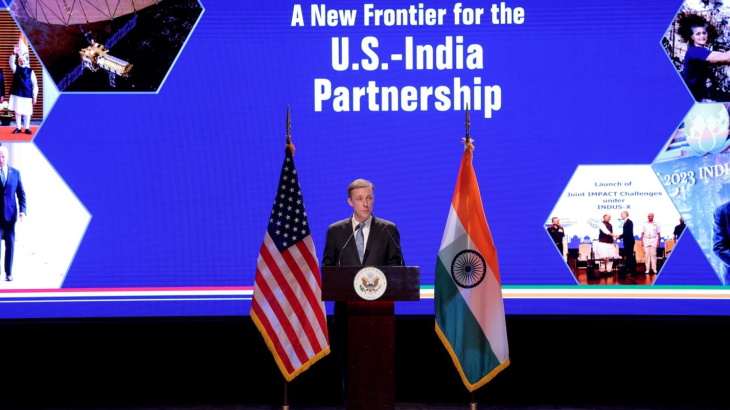The United States (US)-India nuclear cooperation that now includes joint design and manufacturing of Small Modular Reactors (SMRs) marks a significant milestone in their civil nuclear partnership. In pursuit of joint development and potential deployment, in May 2025, the US Department of Energy authorised an American firm, Holtec International, to jointly develop SMRs with its Indian counterparts. Though these reactors are considered part of India’s clean energy program, their dual-use purpose of potential applicability in naval propulsion makes SMRs a strategically sensitive technology. Likewise, the potential for modular deployment creates challenges for the verification regime. This authorisation for the indigenous production of nuclear reactors in India would not only undermine norms of the global Nuclear Non-Proliferation Regime (NPR) but also exacerbate the fragility of strategic stability in South Asia.
India already enjoys access to Russian nuclear markets, and it has long sought assistance from its Western partners, especially the US. Such transfer of dual-use technology and authorisation of development and deployment by the US allows India to capitalise on nuclear exchanges without taking into consideration their legal and safeguard obligations. Until now, the US has allowed its firms to export nuclear equipment to India; however, with this deal, the US has authorised India to produce nuclear components domestically.
Assistance by the US for India’s clean energy objectives and strengthening of the US-India partnership must not be done at the expense of global non-proliferation norms.
By successfully capitalising on the Nuclear Supplier Group (NSG) waiver of 2008, India has signed 14 civil nuclear agreements with multiple states, including South Korea, Kazakhstan, Canada, France, the United Kingdom (UK), Japan and Australia. Given India’s Civil Liability for Nuclear Damage Act (CLNDA, 2010), the US remained largely excluded from India’s reactor market. The NSG waiver enabled India to capitalise on global nuclear commerce despite being a non-Nuclear Non-Proliferation Treaty (NPT) signatory. India has not signed the Comprehensive Nuclear Test Ban Treaty (CTBT) and has not adopted a comprehensive safeguards agreement with the International Atomic Energy Agency (IAEA); still, the US-India strategic partnership enables India to gain access to the global nuclear market.
Read More: Pak-US relations: Areas of Engagement beyond Security Cooperation
Novel designs and flexible deployment of SMRs raise new regulatory challenges that may not be fully addressed by conventional frameworks. Preferential treatment for India is eroding the normative foundations of NPR. As per Article 1 of the NPT, nuclear weapon states are not allowed, even indirectly, to facilitate non-nuclear weapon states in acquiring nuclear weapons. India is not a signatory to the NPT, and it does not comply with IAEA safeguards. New Delhi is expanding its nuclear fissile material beyond the oversight of the international regulatory framework, like the IAEA. As far as the inspection of Indian nuclear facilities is concerned, the IAEA inspection regime is concerned with only the scrutiny of civil facilities. India’s specific safeguard agreement (INFCIRC/754) forbids inspection of nuclear facilities like fast breeder reactors and naval propulsion development. Lack of universal compliance undermines the essence of NPR, questioning the selective applicability of regulatory frameworks like the IAEA and NSG. This selective approach has set the stage for norm erosion and unequal enforcement, increasing crisis instability in South Asia. Conventional asymmetries between Pakistan and India are already augmenting, amidst India’s doctrinal shifts and aggressive strategic posturing.
The US-India civil-nuclear cooperation currently involves the sharing of technology, but with the signing of the SMR deal, exceptionalism will become a new norm. This unprecedented move will lead other states to seek similar entitlements from NPR. In such a scenario, the burden of compliance and restraint will remain unevenly enforced.
Therefore, there is a need to reinforce NPR through principles of equity and transparency. Geopolitical considerations must not take precedence over principles of universalism. Extra-regional architects and enforcers should not grant an exceptional attitude to one actor. Nuclear privilege from the US for its strategic partners like India raises serious concerns for regional stability. Access to peaceful nuclear technology should be undertaken with legal obligations in a universal manner. In pursuit of extending the rule of law over nuclear weapons, all states should adhere to the principles of the NPR. Strategic exceptions for partners risk the stability of overall efforts for disarmament and non-proliferation.
Nuclear exchanges between the US and India highlight the strain between geostrategic considerations and non-proliferation obligations. Assistance by the US for India’s clean energy objectives and strengthening of the US-India partnership must not be done at the expense of global non-proliferation norms. Agreements between states for the exchange of nuclear technology must take into consideration IAEA safeguards and transparency measures. The international community should adopt a balanced approach in ensuring energy security and global non-proliferation norms.
This article has been published in another form: https://cscr.pk/explore/themes/defense-security/us-india-nuclear-cooperation-and-erosion-of-global-non-proliferation-regime/
Ms Nawal Nawaz is Research Assistant at the Center for International Strategic Studies (CISS), Islamabad.
